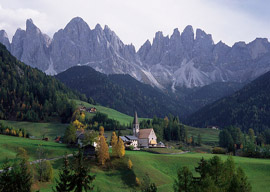
November 18, 2012

Dolomites
On Remembrance Day, the French wear a blue cornflower”le Bleuet de France“which was the color of the French army’s uniform in the 1914-18 war. The British wear a red poppy inspired by the brilliant 1915 poem “In Flanders Fields.”
Italy in theory commemorates its war dead”on November 4th“the day the Austro-Hungarian Empire signed the armistice with Italy in 1918 after the Italians had routed the Austro-Hungarians at the Battle of Vittorio Veneto. But no one really takes any notice. What Italy does remember instead each April 25th is its liberation in 1945. This involves wildly exaggerating the role of the largely communist and largely irrelevant Italian Resistance and conveniently forgetting who really did do the liberating: the Americans, the British, and the Poles.
Given this dire need for a total makeover of Italy’s reputation, there is no better place to start than the stoic bravery their armed forces displayed in World War I”especially as the 100th anniversary of that war’s outbreak is nearly upon us.
Yet on this matter the media silence in Italy is near total. Italy’s communists and their toxic derivatives are to blame, as they are for so much else. In their view, World War I was a criminal war between imperial powers e basta. Their predecessors, the Italian Socialist Party, did their utmost to stop Italian intervention in the conflict which happened in May 1915. Socialist parties elsewhere in Europe, such as those in France and Germany, supported the war.
Few British or American writers visited or served as soldiers on the Austro-Italian front to the north and east of Venice. But this mountain war was as infernal as the trench warfare in the fields of France and Belgium so well described by so many soldier-authors. Among those who did go to Italy was Ernest Hemingway as an 18-year-old Red Cross ambulance driver. He was badly wounded in July 1918 within a month of his arrival at the front. The experience provided the inspiration for his first great war novel A Farewell to Arms (1929).
The few British authors to go included the already hugely famous H. G. Wells, author of The War of the Worlds. Wells was full of genuine praise for the prowess, courage, and organization that he witnessed firsthand from the Italian military in 1916.
The 100th anniversary of World War I’s start will probably involve the European media’s last detailed look at that brutal conflict which unfortunately failed to solve so many of the problems that still haunt Europe, such as the obsession of its chattering classes and bureaucrats with imposing the tyranny of European political union on Europeans against their will.
Yet to remember Italy’s sacrifice in that war would mean left-of-center Italians admitting that the Italian left was and is wrong, that nation-states are not artificial constructs that bourgeois capitalist tyrants impose and that patriotism is a positive, admirable, and perfectly normal feeling. They would have to admit that the internationalist solutions they favor”the latest example being the terrifying European Union”do not work because they are artificially imposed constructs. They would therefore also have to admit that there is no difference between the “empires” of nations that they so despise and the “unions” of nations they so adore. Both lead to the same thing: tyranny.